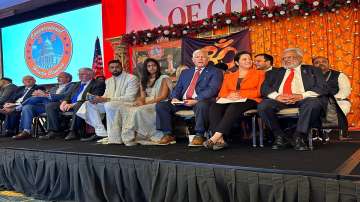United States: US Republicans form Congressional Hindu Caucus in Washington DC
Over 150 members of the US House of Representatives have committed to becoming members of the Congressional Hindu Caucus, making it one of the largest caucuses in the US Congress that would be actively engaged in enacting legislation and passing resolutions important to the Hindu American community.

Know more about Congressional Hindu Caucus:
More than 150 members of the US House of Representatives have committed to becoming members of the Congressional Hindu Caucus, making it one of the largest caucuses in the US Congress that would be actively engaged in enacting legislation and passing resolutions important to the Hindu American community. So who is a Hindu? As a starter, Hinduism is not a religion. I will repeat it again, Hinduism is not a religion. Let me spend a few moments enlightening this distinguished gathering of more than 20 members of US Congress and also many of the 800 plus Hindus from across the United States as to who is a Hindu.
The origin of the word Hindu is Sindhu. Sindhu in Sanskrit means River. Arabs had a difficult time pronouncing Sindhu and called it Hindu, and Europeans later turned it into Indu and that is where Indus Valley and India came from. Sindhu is actually a river that starts at the Himalayan Glacier at Mount Kailash and flows through India and then into what is now Pakistan and into the Arabian Sea. There is another river Ganges that flows entirely through India. The civilization that grew and flourished around these two rivers, the Sindhu/Indus and the Ganges, is more than 10,000 year old and the humanity that lived around these rivers and then later spread to south of India were called Hindus.
So, Hindu is not a religion, it is simply a way of life, it is a culture with rich traditions. Hindus do not have one God or one holy book as Bible. You can be an atheist and still be a Hindu. Hindus are allowed to question, debate and even argue if there is a God or is it just a powerful force. I call it the Free Enterprise of Spirituality. This is one reason, Hindus are secular and extremely tolerant. Hindus believe in Sanatan Dharma, which provides a set of eternal and universal ethical and moral principles of virtuous and true living, principles that are common to Christianity and the Jewish faith.
Being a 10,000-year-old civilization with a penchant for constant learning, Hindus gave the world the numeral zero and decimal point. Imagine where science would be without the invention of zero and decimal point? Hindus were also great in Astrology and medical sciences and were the originators of surgery. So, nobody should be surprised that out of 6 million Hindu Americans in the United States, more than 75 per cent have a Bachelor’s degree, more than 55 per cent have a Master’s degree, one out of eight medical professionals are Hindus, one out of ten has some kind of a business enterprise, and there is not a field of human endeavour where Hindus are near or at the top.
And lately, more than 20 per cent of all high tech start-ups are owned by Hindu Americans and the list of Fortune 100 Hindu CEOs, CTOs, CFO’s is growing every day. The innovation and success of the recent landing by India on the south pole of moon at one tenth the normal cost speaks volumes about Hindus and Sanatan Dharma. Another important stat, Hindu American families have an average per-family income of $135,000 per year, the highest among all ethnicities in the country.
We have a monumental crisis on our southern border with 200,000 illegals crossing the border every month. Mixed with the illegals are terrorists and drug cartels inundating America with Fantanyl which according to CDC is responsible for 110,000 deaths in 2022. For each illegal, we, the tax-payers have to spend $50,000 per year per illegal.
In stark contrast to all this, Hindu Americans are the most law-abiding citizens of the United States and 99.9 per cent came here legally. In addition, we pay over $150 billion in federal, state and local income taxes carrying almost 8 per cent of the tax burden whereas the population of Hindus in America is just under 2 per cent.
We as Hindu Americans have four guiding principles we call the four F’s:
- Free enterprise not only for the material world but free enterprise of spirituality, with minimal governmental interference
- Fiscal discipline of living within our means
- Strong family values, policies that encourage strengthening the fundamental building blocks of our country, the families
- Firm foreign policy and fight against the forces of radical Islam and expansionist regimes who now have formed an axis of evil that is CCP, Chinese Communist Party-KGB- North Korea-Iran